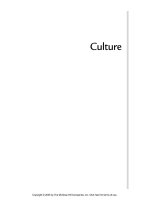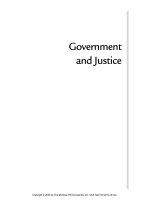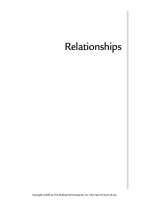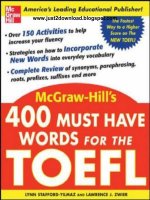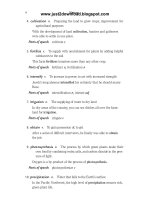Mcgraw Hill 400 Must Have Words For The Toefl - Government and Justice
Bạn đang xem bản rút gọn của tài liệu. Xem và tải ngay bản đầy đủ của tài liệu tại đây (1.88 MB, 34 trang )
Government
and Justice
Copyright © 2005 by The McGraw-Hill Companies, Inc. Click here for terms of use.
This page intentionally left blank.
LESSON
Politics
Target Words
1.
advocate
6.
contest
2.
authority
7.
election
3.
bitterly
8.
inaugurate
4.
candidate
9.
policy
5.
coalition
10.
poll
Definitions and Samples
1.
advocate v.
To speak out in favor of something
Some environmentalists advocate removing large dams from the
Columbia River.
Usage tips
Advocate is usually followed by a term for a process or
action, very often the -ing form of a verb
Parts of speech
advocate
n,
advocacy
n
2.
authority n.
The power to make decisions, to tell others what to do.
The governor has the authority to call the legislature together for
emergency sessions.
Usage tips
A to phrase often follows authority.
Parts of speech
authorize
v,
authoritative
adj
25
Copyright © 2005 by The McGraw-Hill Companies, Inc. Click here for terms of use.
3.
bitterly adv.
Strongly and with a lot of bad feelings
Senator Thomas bitterly opposed the movement to design a new
state flag.
Parts of speech
bitterness
n,
bitter
adj
4.
candidate n.
Someone who wants to be chosen, especially in an elec-
tion, for a position
In most U.S. elections, there are only two major-party candidates for
president.
Usage tips
Candidate is often followed by a for phrase.
Parts of speech
candidacy
n
5.
coalition n.
A group of several different groups or countries that are
working together to achieve a certain goal.
Several local churches, mosques, synagogues, and temples formed
a coalition to promote understanding among people of different
religions.
6.
contest v.
To challenge
Dave Roper, who narrowly lost the mayor’s race, contested the re-
sults, demanding a recount of the votes.
Usage tips
The noun contest can mean a game, especially one played
for a prize.
Parts of speech
contest
n
7.
election n.
A process in which people choose officials
Because of problems with vote-counting four years ago, inter-
national observers monitored this year’s election to make sure it
was fair.
Parts of speech
elect
v,
elective
adj
8.
inaugurate v.
To bring into public office; to start formally
The U.S. president is elected in November but is not inaugurated
until the following January.
124
Government and Justice
An effort to bring electric service to farms and small towns was
inaugurated with the Rural Electrification Act of 1936.
Usage tips
When it means “bring into public office,” inaugurate is
usually in the passive voice.
Parts of speech
inauguration
n,
inaugural
adj
9.
policy n.
An approved way for approaching a certain kind of situation
The policy said that government money could not be given to any
private hospital.
10.
poll v.
To find out a small group’s opinion so that you can guess what
a much larger group thinks
The newspaper polled 500 registered voters and found that only 27
percent were in favor of expanding the city zoo.
Parts of speech
poll
n,
pollster
n
TOEFL Prep I
Find the phrase that best describes each word in
the left-hand column. Write the letter in the blank.
1. policy (a) a process of choosing
2. candidate (b) a kind of power
3. authority (c) a kind of person
4. coalition (d) a way of handling a situation
5. election (e) a kind of group
TOEFL Prep II
Complete each sentence by filling in each blank
with the best word from the list. Change the form of the word if nec-
essary. Use each word only once.
advocated bitterly contest inaugurated polled
1.
In the early twentieth century, politicians fought __________ about
whether the U.S. dollar should be based on gold.
2.
Only one month after he was __________, President Harrison fell
sick and died.
Politics
125
3.
My opponent says that I cheated on my taxes. I __________ that
charge, and I will prove him wrong.
4.
Their predictions about the election results were not very accurate be-
cause they __________ too few people in advance.
5.
Last year, the Freedom Party __________ giving medical treatment
even to people who could not pay for it.
TOEFL Success
Read the passage to review the vocabulary you
have learned. Answer the questions that follow.
In the history of U.S. presidential elections, the year 1876 stands out as
one of the oddest.That year, polls suggested that one person had won the
popular vote but another had won more official electoral votes—just as
happened in the year 2000. In 1876, however, the election was so bitterly
contested that a special electoral commission was given the authority
to determine which candidate—Republican Rutherford B. Hayes or
Democrat Samuel J. Tilden—had won. This commission represented a
coalition of interests. The Democrats favored this because otherwise the
head of the Senate, Republican Thomas Ferry, would probably have been
allowed to declare the winner. In the end, the Democrats were dis-
appointed, as the commission advocated the Republican cause. The
situation was not settled until March 2 of 1877, only three
days before the scheduled inauguration of a new president—
Hayes, as it turned out. Only then did America find out who
its new leader would be. Americans seem not to have learned
many lessons from 1876, however, because in 2000 there was
still no official policy on how to settle an election that hung
on a few contested votes. The problem was settled (by the
Supreme Court) much faster in 2000, but still, no real system had been set
up to deal with the situation.
126
Government and Justice
Bonus Structure—
As it turned out
is an adverbial
clause indicating an
eventual resolution
of a long-standing
problem.
1.
In what way was the 1876 election even odder than that in 2000?
a.
It happened much earlier.
b.
It involved only two major candidates.
c.
One person won the popular vote and another won the electoral
vote.
d.
The uncertainty over who would win the presidency lasted many
months.
2.
Who decided the outcome of the 1876 election?
a.
a special electoral commission
b.
Thomas Ferry
c.
the Supreme Court
d.
Rutherford B. Hayes
Lesson 25
Politics
TOEFL Prep I
1.
d
2.
c
3.
b
4.
e
5.
a
TOEFL Prep II
1.
bitterly
2.
inaugurated
3.
contest
4.
polled
5.
advocated
TOEFL Success
1.
d
2.
a
Politics
127
LESSON
A Reasonable Doubt
Target Words
1.
accuse
6.
offense
2.
allegedly
7.
peer
3.
civil
8.
suspect
4.
convict
9.
verdict
5.
guilty
10.
witness
Definitions and Samples
1.
accuse v.
To say that someone did something wrong (e.g., committed
a crime)
Jordan was accused of using a stolen credit card to buy about $300
worth of electronic equipment.
Usage tips
Accuse is often used in the passive voice.
Parts of speech
accusation
n,
accuser
n
2.
allegedly adv.
According to what people say
The chief financial officer of the company allegedly took company
money for his personal use.
Parts of speech
allege
v,
allegation
n
3.
civil adj.
Involving a dispute between two citizens, not a criminal charge
In a civil suit against his neighbor, Barney claimed that the neigh-
bor’s dog had bitten him.
26
Copyright © 2005 by The McGraw-Hill Companies, Inc. Click here for terms of use.
Usage tips
In a court context, civil almost always appears in one of
the following phrases: civil suit, civil action, civil court, civil
proceedings, and civil penalties.
4.
convict v.
To decide that someone is guilty of a crime
Dean was convicted of assault after the jury saw a video of him
striking another man.
Usage tips
Convict is often used in the passive voice.
Parts of speech
convict
n,
conviction
n
5.
guilty adj.
Responsible for doing something bad
The jury found that the director was guilty of embezzlement.
Usage tips
Guilty is often followed by an of phrase that names a
crime or bad deed.
Parts of speech
guilt
n,
guiltily
adv
6.
offense n.
A specific act that breaks the law
Convicted twice of reckless driving,Victor will lose his license if he
commits another serious traffic offense.
Parts of speech
offender
n,
offensive
adj
7.
peer n.
A person who is one’s social equal
In requiring judgment by “a jury of one’s peers,” U.S. law meant to
protect lower-class defendants from the possibly biased judgment of
upper-class juries.
8.
suspect n.
Someone who, in the opinion of the police, might have com-
mitted a certain crime
The police were investigating the activities of five suspects in the
liquor-store robbery.
Parts of speech
suspect
v,
suspicion
n,
suspicious
adj,
suspiciously
adv
A Reasonable Doubt
129
9.
verdict n.
A judgment in a court case
It took the jury only 30 minutes to reach a verdict of “guilty.”
Usage tips
Verdict is often the object of the verbs reach or
arrive at.
10.
witness v.
To see something, especially a crime, happen
After witnessing the car theft, Rodney called the police.
Parts of speech
witness
n
TOEFL Prep I
Find the word or phrase that is closest in mean-
ing to each word in the left-hand column. Write the letter in the
blank.
1. accuse (a) to determine that someone is
guilty
2. convict (b) responsible for a crime
3. civil (c) a social equal
4. guilty (d) being related to a personal
dispute, not a crime
5. peer (e) to say someone did a bad
thing
TOEFL Prep II
Circle the word that best completes each sentence.
1.
The most likely (suspect / witness) in the murder was the victim’s
brother, but no one actually saw the crime.
2.
The new president (allegedly / guiltily) had his main opponents killed,
but he denies it.
3.
At one time in the United States, possession of marijuana was a minor
(verdict / offense).
4.
The (witness / peer) made a poor impression on the jury because he
couldn’t remember many details about the crime scene.
5.
Juries are instructed to arrive at a unanimous (verdict / convict), one
agreeable to all members of the jury.
130
Government and Justice
TOEFL Success
Read the passage to review the vocabulary you
have learned. Answer the questions that follow.
One of the most controversial murder cases of the twentieth century was
that involving the death of Marilyn Sheppard in 1954. Her husband, Dr.
Sam Sheppard, was accused of killing her and then injuring himself. An
unlikely suspect, Sheppard was highly respected by his peers in the
medical world. Still, there were odd aspects to the murder that Sheppard
could not explain away. Unfortunately for Sheppard, none of his
supporters actually witnessed the crime, so nobody could back up
Sheppard’s claim that the real killer was a bushy-haired man whom
Sheppard had chased across his lawn and fought with briefly.
Sheppard was eventually convicted of the offense, but
many people doubted the verdict. With aggressive help
from a lawyer named F. Lee Bailey, Sheppard got a new
trial. Bailey suggested many alternatives to Sheppard’s
guilt, enough that the new jury could not say he was guilty
beyond a reasonable doubt. Sheppard was released from
prison but died soon afterward. His son, Chip, pursued the
case through several civil and criminal proceedings in an attempt to find
out the truth about his mother’s murder. Late in the 1990s, new DNA
analysis techniques proved that someone other than Sam Sheppard and
his family had been in the house that night. Sheppard’s story about the
bushy-haired man had probably been accurate all along.
1.
Why was the Sheppard case unusual?
a.
A husband was accused of murdering his wife.
b.
The murder occurred in 1954.
c.
Doubt about the guilty verdict led to a second trial.
d.
The accused murderer said he didn’t do it.
2.
The author of this article implies that Sam Sheppard __________
a.
did not kill his wife
b.
lied about the bushy-haired man
c.
did not love his wife
d.
married again after he got out of prison
A Reasonable Doubt
131
Bonus Structure—
The clause con-
taining but and
doubt signals
that arguments
against the verdict
will be given.
Lesson 26
A Reasonable Doubt
TOEFL Prep I
1.
e
2.
a
3.
d
4.
b
5.
c
TOEFL Prep II
1.
suspect
2.
allegedly
3.
offense
4.
witness
5.
verdict
TOEFL Success
1.
c
2.
a
132
Government and Justice
LESSON
The Police
Target Words
1.
apprehend
6.
implicate
2.
ascertain
7.
inquiry
3.
bureaucratic
8.
intrusively
4.
condemn
9.
seize
5.
evidence
10.
surveillance
Definitions and Samples
1.
apprehend v.
To capture
The police apprehended the robbery suspect as he tried to get on a
bus to Chicago.
Parts of speech
apprehension
n
2.
ascertain v.
To make sure of
The police failed to ascertain that the man they arrested was the
Gregory Brown they were really looking for.
Usage tips
Ascertain is often followed by a that clause. Notice that
the root of the word is the adjective certain, meaning “sure.”
3.
bureaucratic adj.
Related to a large organization with a lot of com-
plicated procedures
Before I could speak with the chief, I had to go through a
bureaucratic runaround of identity checks and written requests.
27
Copyright © 2005 by The McGraw-Hill Companies, Inc. Click here for terms of use.


